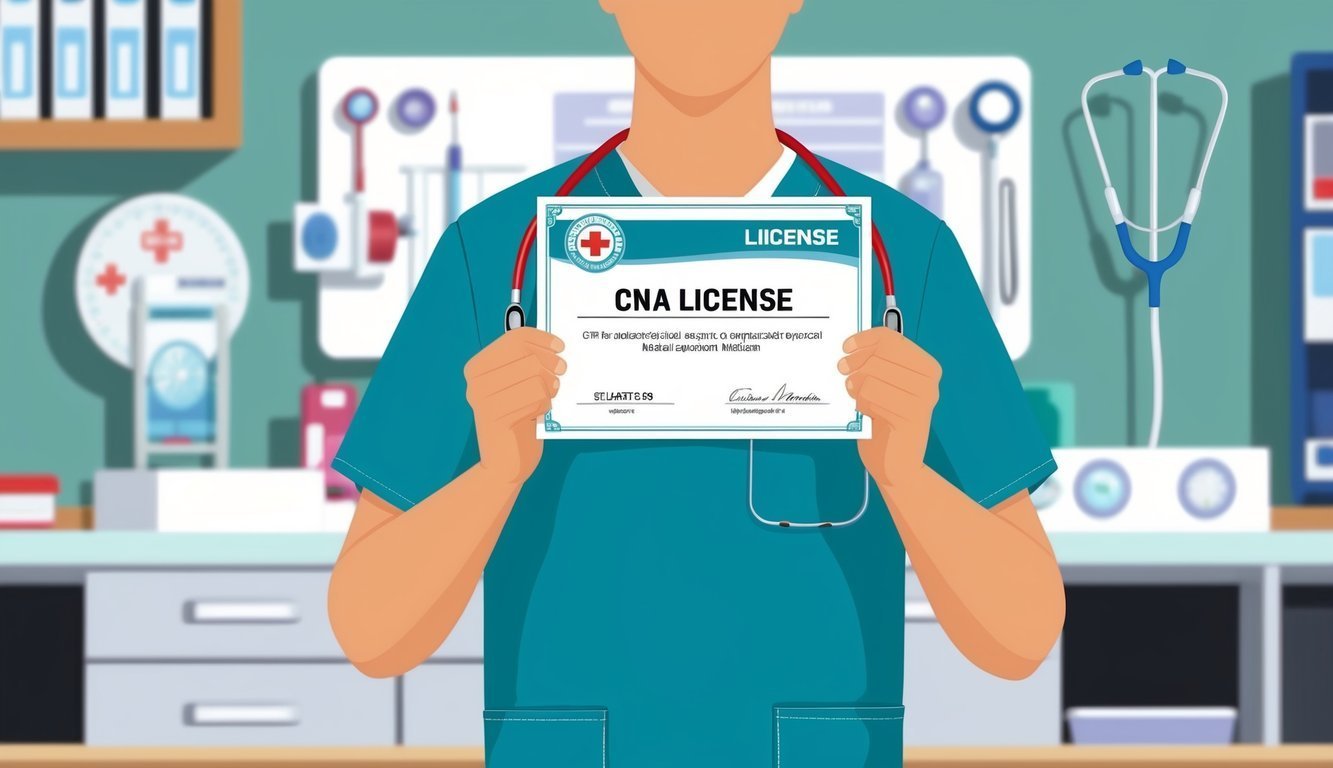Becoming a Certified Nursing Assistant (CNA) is a rewarding career choice that allows you to make a significant impact on patients’ lives.
To pursue this path, obtaining a CNA license is essential, as it verifies your training and competencies in the healthcare field.
To acquire a CNA license, you must complete a state-approved training program, pass a competency evaluation, and adhere to your state’s specific requirements.
Your journey begins with selecting an accredited training program tailored to your state’s regulations.
Training typically includes both classroom instruction and hands-on clinical experience.
Once you’ve met the educational requirements, you will need to pass a certification exam that evaluates your knowledge and practical skills.
Taking these steps not only enhances your employability but also ensures you are well-prepared for the responsibilities of the role.
Maintaining your CNA license is equally important.
You are often required to complete continuing education or work a certain number of hours within a specified timeframe to keep your certification active.
Knowing these requirements can help you stay ahead in your career.
This path opens doors to various healthcare environments, making it a promising opportunity for those looking to serve in a vital role within the medical field.
For additional guidance on the licensing process, you can refer to resources like Nurse.org or Red Cross.
Understanding CNA Certification
Becoming a Certified Nursing Assistant (CNA) involves specific responsibilities, pathways, and requirements that vary by state.
This section provides essential details about the role of a CNA, the certification pathways, and the specific requirements set by different states.
Role of a Certified Nursing Assistant
As a certified nursing assistant, you play a crucial role in healthcare settings.
Your primary duties include providing basic patient care, aiding nurses with medical tasks, and ensuring patient comfort.
Common responsibilities you may encounter include:
- Assisting with daily activities like bathing and dressing
- Monitoring patient vital signs
- Reporting changes in a patient’s condition to nursing staff
Your work significantly impacts patient recovery and well-being, making effective communication and compassion essential skills.
Pathways to Certification
To achieve your CNA certification, you must follow a structured pathway.
The initial step typically involves completing a state-approved CNA training program.
Here’s a brief outline of the process:
- Complete a Training Program: Finish a state-certified training course that covers both theoretical and practical aspects.
- Pass the Competency Exam: Successfully complete a nurse aide competency evaluation to demonstrate your skills.
- Apply for State Certification: Submit your application to your state’s Department of Health for official certification.
Upon meeting these requirements, you can begin your nursing assistant career.
State-Specific Requirements
CNA certification requirements can vary significantly from one state to another.
It is essential to familiarize yourself with your state’s regulations to ensure compliance.
| Requirement | Description |
|---|---|
| Training Hours | States typically require a minimum of 75 hours of training. |
| Clinical Experience | At least 16 hours of hands-on clinical work is often mandated. |
| Competency Exam | Passing a state-administered competency exam is necessary. |
| Recertification | Most states require you to work a minimum of 18 hours every 24 months to maintain your certification. |
Make sure to consult the Nurse.org for specific requirements tailored to your state’s certification process.
This knowledge equips you to successfully navigate your path to becoming a CNA.
CNA Training Programs
CNA training programs are designed to equip you with the skills necessary to become a Certified Nursing Assistant.
Understanding the curriculum, finding a state-approved program, and choosing between online and in-person formats are essential steps in your journey.
Curriculum Overview
The curriculum of a CNA training program typically includes both theoretical and practical components.
Key areas covered include:
- Basic nursing skills: You will learn crucial tasks such as bathing, feeding, and mobility assistance.
- Medical terminology: Understanding terms used in healthcare settings is vital.
- Patient care: This includes communicating effectively with patients and understanding their needs.
- Safety and infection control: Proper methods to maintain a safe environment will be emphasized.
Most programs require a minimum of 75 hours of training, which should include clinical practice in a healthcare setting.
The American Red Cross offers a widely recognized program that covers these topics and often has a high graduation rate, preparing you well for your certification exam.
Finding a State-Approved Training Program
To become a CNA, you must complete a state-approved training program.
Each state has different requirements, so it’s essential to check with local regulations.
Look for programs at:
- Community colleges
- Vocational schools
- Hospitals
- The American Red Cross
Ensure that the program is accredited and meets state standards.
You can find listings of state-approved training programs on platforms like Nurse.org to streamline your search.
Online vs. In-Person Programs
When considering your options, you may wonder whether to pursue training online or in-person.
Each format has its advantages.
-
Online Programs: These can offer flexibility, allowing you to balance work or family commitments. Many online programs still require in-person clinical hours.
-
In-Person Programs: They provide hands-on training, which can be crucial for skill development. Interaction with instructors and peers can enhance your learning experience.
Ultimately, the choice depends on your learning style and personal circumstances.
Assess your options carefully to select the program that best suits your needs.
The Certification Process
Obtaining a Certified Nursing Assistant (CNA) license involves a structured process that includes meeting specific application requirements, passing a competency evaluation examination, and undergoing background checks and health assessments.
Each step ensures that you are prepared to provide quality care in various healthcare settings.
Application Requirements
To start your journey, you must first fulfill certain application requirements.
Typically, this includes completing a state-approved CNA training program that consists of both classroom instruction and hands-on clinical experience.
Common Requirements Include:
- Minimum age of 18 or parental consent
- Proof of High School Diploma or GED
- Completion of a CNA training program, usually requiring 75–140 hours depending on the state
Once you meet these prerequisites, you will need to submit an application to your state’s nursing board or regulatory agency.
This application often requires a fee and may involve submitting transcripts or proof of training completion.
For more detailed requirements based on your state, you can visit Nurse.org.
Competency Evaluation Examination
After submitting your application, you must pass a competency evaluation examination, which consists of two parts: a written or oral test and a skills demonstration.
The written component assesses your knowledge of patient care, safety practices, and infection control.
Key Points for the Examination:
- Typically includes 60-100 multiple-choice questions
- Skills test requires you to demonstrate key tasks, such as taking vital signs or performing patient care techniques
Passing both sections of the exam is crucial for certification.
Upon successful completion, your name will be added to the CNA registry in your state, allowing you to practice.
For more information about the exam, visit The CNA Guide.
Background Checks and Health Requirements
Before obtaining your CNA license, most states require a background check to ensure patient safety.
This usually involves criminal history verification and submission of fingerprints.
In addition to background checks, you may need to meet specific health requirements, such as:
- Up-to-date vaccinations (e.g., Hepatitis B, MMR)
- A physical examination to ensure you are fit for duty
These checks help maintain high standards within the healthcare profession.
It’s essential to be aware of your state’s specific laws and health regulations, as they can vary widely.
For a comprehensive look at state-specific health requirements, refer to Registered Nursing.
Maintaining and Advancing Your CNA License
To maintain and advance your CNA license, you must engage in continuing education, understand the renewal process, and explore options for advancing within the nursing field.
Each aspect plays a crucial role in ensuring your certification remains valid and enhances your career prospects.
Continuing Education
Continuing education is essential for CNAs to stay current with best practices and industry standards.
Many states require a specific number of continuing education hours every year to maintain your certification.
- Topics: Courses may cover infection control, patient care techniques, and legal regulations.
- Providers: Look for accredited providers online or via local nursing organizations.
Check with your state’s nursing board for specific requirements and approved courses.
Staying informed keeps your skills sharp and prepares you for advancements.
Renewal Process
Renewing your CNA license typically involves submitting a renewal application along with any required fees.
The specifics can vary by state, so familiarize yourself with your local regulations.
- Application: Complete your state’s renewal application, which can often be done online.
- Fees: Payment may be required to process your renewal.
- Verification: Ensure your previous employment and continuing education hours are documented for verification.
Timely renewal helps you avoid penalties and ensures seamless continuation of your certification.
Check more about the renewal process here.
Advancing in the Nursing Field
To progress in the nursing field, consider pursuing further education or certifications.
You might look into specialized training or advanced certifications, which can enhance your career opportunities.
- Specialties: Explore areas such as geriatrics or pediatrics for specialized CNA roles.
- Advance: Certificates in nursing assistance may lead to roles like licensed practical nurse (LPN) or registered nurse (RN).
If you’re considering relocation, investigate the reciprocity application process, which allows you to transfer your certification to another state.
This step is crucial when seeking job opportunities elsewhere.
Check guidelines for certification verification and reciprocity in your target state here.
Employment and Career Outlook

As a Certified Nursing Assistant (CNA), you can expect diverse job opportunities in various healthcare settings.
Understanding the job outlook, statistical data, and opportunities for advancement is essential for making informed career decisions.
Working in Different Health Care Settings
CNAs primarily work in a range of healthcare environments including:
- Nursing Facilities: These include long-term care and rehabilitation centers where you assist residents with daily activities.
- Home Health Care: You provide support to patients in their own homes, often helping with personal care and medication management.
- Hospitals: In this setting, you assist nursing staff and support patient recovery procedures.
Working conditions can vary significantly, reflecting the needs of patients and the specific environment.
Each setting requires strong communication and interpersonal skills, ensuring quality care.
Job Outlook and Statistics
The Bureau of Labor Statistics projects a 4% growth in employment of nursing assistants from 2023 to 2033.
This growth is consistent with the average across all occupations.
Here’s a breakdown of key statistics:
| Statistic | Value |
|---|---|
| Estimated Current CNA Jobs | 1.5 million |
| Projected Job Growth (2018-2028) | 137,800 additional |
| Average Annual Job Openings | 216,200 |
This data indicates robust demand for qualified nursing assistants, making now an ideal time to enter this field.
Opportunities for Advancement
As a CNA, you can advance your career in several ways.
Many CNAs choose to pursue further education and training.
Some roles you can aim for include:
- Licensed Practical Nurse (LPN): This role requires additional training, but it offers increased responsibility and higher pay.
- Registered Nurse (RN): With a higher degree, you can take on more complex patient care tasks and supervision.
Advanced certifications and specialized trainings can enhance your skills, making you more competitive in the job market.
Continuing education programs are widely available through various institutions.
These programs often focus on specialized areas of healthcare.

